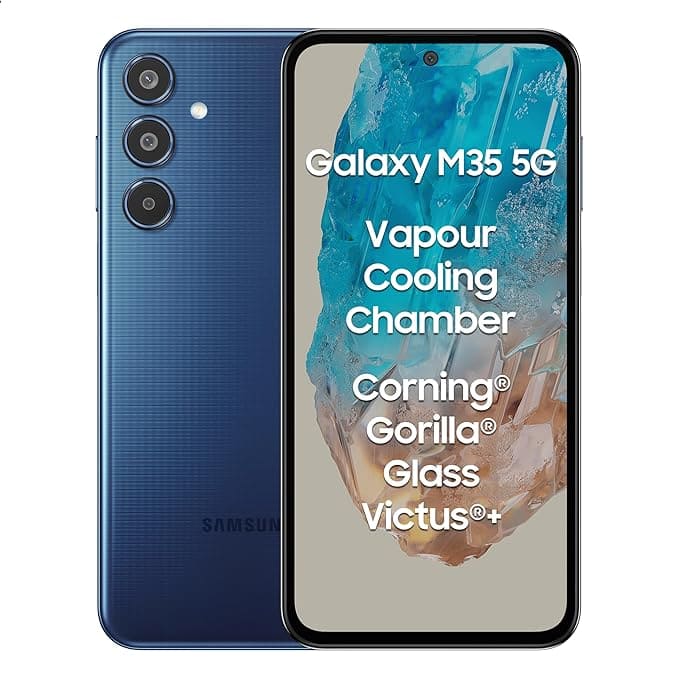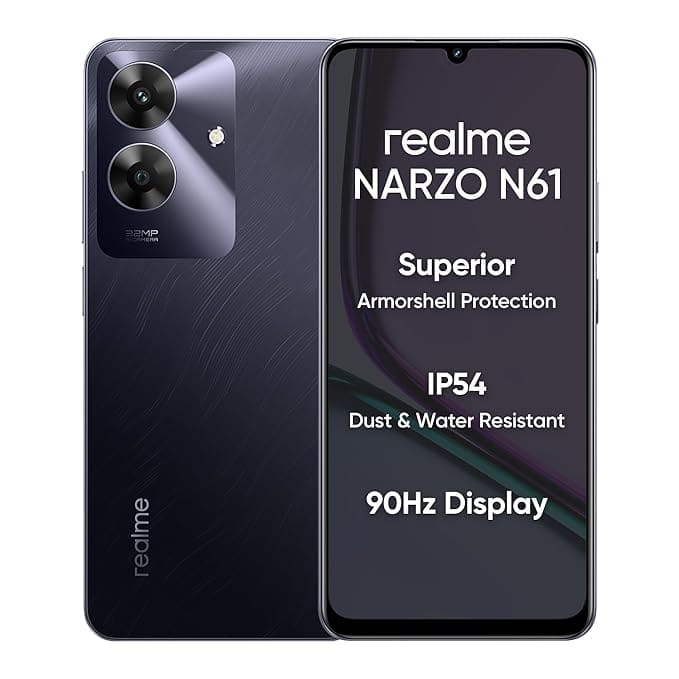English : Unit 1 : Prose : The Nose-Jewel
Warm up
What are the life lessons that you can learn form the birds? Match the birds with the characters given in the box and fill in the blanks.
Arise and awake, Beautiful, Unity, Focused, Melodious, Time conscious
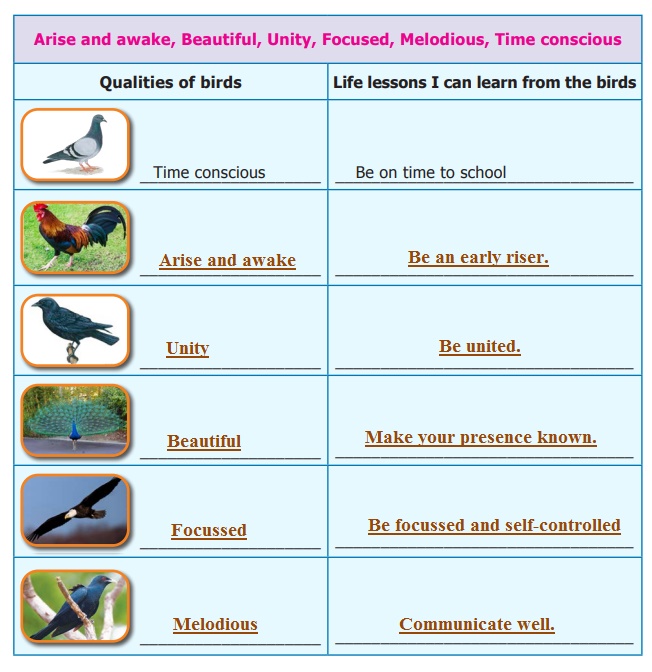
Glossary
1. self-centred (adj) – concerned with the self
2. disdain (n) – feeling of contempt or scorn
3. muck-heap (n) – heap
4. grub (n) – food
5. magistrate (n) – a judicial officer with limited authority to administer and enforce the law.
6. disgrace (n) – the state of being dishonored, or covered with same ignorant (adj) – unaware
7. consoled (v) – comforted (someone) in the time of grief, disappointment
8. suspected (v) – believed to be a cause or at fault
9. flutter (v) – to flap or wave quickly but irregularly
10. confined (v) – restricted, kept in a limited space or area
11. panic (adj) – frightened
12. cruel (adj) – merciless or heartless
13. gravely (adv) – in a grave or serious manner
Questions Answers
Read and Understand
A) Choose the correct synonyms for the italicized words.
1. Nice fun indeed
a. infact
b. doubtedly
c. fine
Answer: (a) infact
2. The poor woman is in a panic.
a. fear
b. grid
c. crash
Answer: (a) fear
3. The mother consoled her little girl.
a. pretended
b. comforted
c. left
Answer: (b) comforted
4. You are always self-centred.
a. egostic
b. generous
c. heroic
Answer: (a) egoistic
5. What is the secret you are whispering?
a. rumour
b. murmur
c. louder
Answer: (b) murmur
B) Find the antonym for the following words.
1. Delight × displease
2. Disgrace × glory
3. Careless × careful
4. Secret × public
5. confine × release
C) Fill in the blanks.
1. The sparrows built their nests in the roof of Ramayya’s house.
2. The diamond jewel was lying in the muck-heap.
3. The diamond jewel belonged to Meenakshi Ammal’s daughter.
4. Kuppayi was the servant maid of Meenakshi Ammal.
5. Ramayya and his wife lived with the fear of getting caught.
D) Say the following statements are True or False.
1. Two sparrows built a nest on a tree top. [Answer: False]
2. Kuppayi swept out the diamond jewel. [Answer: True]
3. Ramayya gave the diamond jewel to the magistrate. [Answer: False]
4. Ramayya’s wife put the stud away in her box. [Answer: True]
5. The Police searched Rammaya’s home. [Answer: False]
E) Answer the following questions
1. Where did the sparrows build the nest?
Answer: The sparrows built the nest in a nice spot in the roof of Ramayya’s house.
2. Why did the bird drop diamond stud?
Answer: The wife bird shouted at the male bird to go in search of food. So it dropped the diamond stud.
3. What were the words of Meenakshi Ammal to her daughter?
Answer: Meenakshi Ammal told her daughter not to tell her father about the lost diamond nose-stud.
4. Who was suspected of stealing the diamond nose stud?
Answer: The maid-servant Kuppayi was suspected of stealing the diamond nose stud.
5. What did Ramayya’s wife do with the stud?
Answer: Ramayya’s wife put the stud away in her box.
6. What happened to Ramayya’s wife at the end?
Answer: Ramayya’s wife developed a severe fever and was confined to her bed.
F) Answer the following in about 100 words.
1. Why did the sparrow throw the nose jewel into Ramayya’s house?
Answer: One day, the male sparrow found a diamond nose-jewel in a heap. He picked it up and came to the nest with the shining stud in his beak and informed his wife about it. The female bird shouted at him and told, him that the diamond jewel was not of any use to her. She asked the male sparrow to search for food for their young ones. So the bird dropped the diamond stud on the floor and went out in search of little worms for the young ones.
2. Explain how Ramayya’s wife reacted when she saw the nose jewel?
Answer: When Ramayya’s wife was sweeping the floor she found the diamond nose stud. She picked it up with delight and wore it. Her husband told her that it was a mistake to keep the jewel. She did not bother about it. She knew that the jewel belonged to her neighbour’s daughter. Yet she did not reveal about it to anyone. The maid-servant of the neighbour was suspected. The police searched her hut, but could not find it. Ramayya’s wife put the stud away in her box. She soon developed a server fever and was confined to her bed.
Very Short Questions and Answers:
1. Where did Ramayya live?
Answer: Ramayya was a simple man who lived in a town.
2. What did the male-bird find?
Answer: The male-bird found a diamond stud in a heap.
3. What did Ramayya’s wife notice?
Answer: Ramayya’s wife noticed the diamond stud, as she was sweeping the floor.
4. Who was Kuppayi?
Answer: Kuppayi was the maid-servant of Meenakshi Ammal.
5. Did the police find anything?
Answer: The police could not find anything.
Short Questions and Answers:
1. What did the male-bird say to the female-bird about Ramayya’s wife?
Answer: The male-bird complained to his wife that Ramayya’s wife always quarrelled with his wife.
2. What was the state of Ramayya, when the police were searching the stud?
Answer: Ramayya’s heart was in a flutter. He was frightened that the police would come to his house and search for the stud.
Vocabulary
Homophone
Homophones are words with same pronunciation but different meanings, origins, or spelling.
For Example:
new – knew
hole – whole
knight – night
see – sea
a. Pick out the correct homophone.
1. I am not allowed to drink soda. (aloud,allowed)
2. The wind blew the leaves. (blue,blew)
3. I will meet my friend. (meat,meet)
4. He will play the role in the second play. (role,roll)
5. I have seen the movie already. (scene,seen)
b. Choose the correct homophone.
1. Every morning my father likes to look at the ________ on the grass.
a) due
b) dew
[Answer: (b) dew]
2. Chennai is the ________ of Tamilnadu.
a) capitol
b) capital
[Answer: (b) capital]
3. I was very ________ last weekend because my friends went to the village without informing me.
a) bored
b) board
[Answer: (a) bored]
4. The cat caught the _______ of a mouse.
a) scent
b) cent
[Answer: (a) scent ]
5. The _______ rises in the east.
a) son
b) sun
[Answer: (b) sun]
Abbreviation and Acronyms
a. Abbreviation:
An abbreviation is a shortened form of a word or phrase. Example: PM – Prime Minister
Example:
ATM: Automated Teller Machine
GB: Giga Byte
PC: Personal Computer
CEO: Chief Educational Officer
EMIS: Education Management Information System
IAS: Indian Administrative Service
NMMS: National Means cum Merit Scholarship
SBI: State Bank of India
OTP: One Time Password
IFSC: Indian Financial System Code
PDF: Portable Document Format
LED: Light Emitting Diode
UPS: Uninterruptible Power Supply
GST: Goods and Services Tax
b. Acronyms:
An acronym is a shortened form of a phrase and is usually made up of the initial letters of that phrase. for example: NATO – North Atlantic Treaty Organization.
Example:
AVADI: Armoured Vehicles and Ammunition Depot of India
RAM: Random Access Memory
ROM: Read-Only Memory
NEET: National Eligibility cum Entrance Test
UDISE: Unified District Information System for Education
PAN: Permanent Account Number
WHO: World Health Organization
NEWS: North, East, West and South.
SIM: Subscriber Identification Module
LAN: Local Area Network
VAT: Value Added Tax
Expand the following:
1. ECG Electrocardiogram
2. ILO International Labour Organisation
3. SCERT State Council of Educational Research and Training
4. IIT Indian Institute of Technology
5. ISRO Indian Space Research Organisation
6. FIR First Information Report
7. UNESCO United Nations Educational, Scientific and Cultural Organization
8. UNICEF United Nations International Children’s Emergency Fund
9. NASA National Aeronautics and Space Administration
10. AIDS Acquired Immune Deficiency Syndrome
11. ADHD Attention Deficit Hyperactivity Disorder
12. UFO Unidentified Flying Object
13. FAQ Frequently Asked Questions
1. GST Goods and Services Tax.
2. BPL Below Poverty Line
3. BSF Border Security Force
4. CBEC Central Board of Excise and Customs
5. CBI Central Bureau of Investigation
6. CBSE Central Board of Secondary Education
7. CCTV Closed-Circuit Television
8. CFL Compact Fluorescent Lamp
9. NGO Non-Governmental Organisation
10. SSC Staff Selection Commission
Listening
c) Listen to the passage carefully and choose the right answer.
“Why Do Birds Sing?”
Why do birds sing? You might assume that birds sing because they are happy. While birds might be happy, they sing in order to communicate. One reason they sing is to stake a claim on territory. Birds sing to warn other birds to stay off their property. For example, a robin might stake a claim on a piece of land which measures about 200 feet wide by 200 feet long. This amount of land provides enough worms for the robin to feed its family. A bird maintains singing perches around the outside edges of its territory. The perches are high in the trees, so other birds can see and hear it. Birds also sing to find a mate. The length and complexity of the mating song gives information about the fitness of the bird. Healthy birds can sing longer, more complicated songs. Birds call to one another in shorter vocalizations in order to warn of danger and to locate one another. Birds sing instinctively. Young birds learn to perfect their songs by listening to adult birds and interacting with other birds. Birds in a local area might learn variations in the basic song which help them recognize other members of their group.
1) Why do birds sing?
a) To locate one another
b) To warn other birds
c) To find a mate
d) All of the above
[Answer: (d) All of the above]
2) Birds perch very high so that ……
a) other birds can hear them
b) other birds can see them
c) they can hide there
d) Both A and B are correct.
[Answer: (d) Both A and B are correct.]
3) The health of a bird can be determined…
a) by the length of its song
b) by the complexity of its song.
c) by the volume of its song
d) Both A and B are correct.
[Answer: (d) Both A and B are correct.]
4) Shorter bird vocalizations are …
a) territorial songs
b) mating songs
c) warnings
d) None of the above
[Answer: (c) warnings]
5) Young birds perfect their songs by …
a) natural instinct
b) listening and interaction
c) practice
d) Both B and C are correct
[Answer: (b) listening and interaction]
6) Fitness is …
a) health.
b) danger
c) a song
d) a warning.
[Answer: (a) health]
7) How do variations in the basic song help the birds?
a) recognize other members
b) Maintain health
c) Increase the length of their song
d) Communicate with one another.
[Answer: (a) recognize other members]
Speaking
Greetings
There are a number of greetings we use when meeting people. These greetings depend on whether we are meeting people, leaving people or meeting people for the first time.
Meeting People for the First Time
When introduced to someone for the first time, use the following greetings:
Hello, it’s a pleasure to meet you. How do you do?
Example Dialogues
Fatima: Ameera, this is Fatima.
Ameera: Hello, it’s a pleasure to meet you. Fatima : How do you do?
Ameera: How do you do?
Note: The reply to ‘How do you do?’ is ‘How do you do?’ This is appropriate when
you meet someone for the first time.
Meeting People
When meeting people during the day, use the following phrases.
Formal
Good morning / afternoon / evening!
How are you?
It’s good to see you.
Informal
Hi!
Hey, how’s it going?
What’s up?
Example
Bhuvana : Good morning Roshini.
Ilango : Good morning. How are you?
Bhuvana : What’s up?
Ilango : Nothing much. You?
Formal Greetings: Arriving
* Good morning / afternoon / evening!
* Hello (name) , how are you?
* Good day Sir / Madam (very formal)
* Good morning Mr. Raju.
* Hello Ms. Sherlyn. How are you today?
Informal Greetings: Arriving
Hi / Hello! – : How are you? / How are you doing?
How are you?- : Very well, thank you. And you? (formal)
How are you doing?- : Fine / Great (informal)
What’s up? (very informal) : Not much. I’m just (watching TV, cooking dinner, etc.)
Informal Greetings After a Long Time
If you haven’t seen a friend or family member for a long time, use one these informal greetings to mark the occasion.
* It’s great to see you!
* How have you been?
* Long time, no see.
* How are you doing these days?
Formal Greetings: Departing
Use these greetings when you say goodbye at the end of the day. These greetings are appropriate for work and other formal and informal situations.
Formal
Good morning / afternoon / evening.
It was a pleasure seeing you.
Goodbye.
Goodnight. (Note: Use after 8 p.m.)
Informal
Nice seeing you!
Goodbye / Bye
See you later
Later (very informal)
Practice Dialogues
Greetings in Informal Conversations:
Amala: Sanjay, what’s up?
Sanjay: Hi Amala. Nothing much. I’m just hanging out. What’s up with you?
Amala: It’s a good day. I’m feeling fine.
Sanjay: How is your sister?
Amala: Oh, fine. Not much has changed.
Sanjay: Well, I have to go. Nice seeing you!
Amala: Later!
Answer:
(i) what’s up
(ii) Nothing much
(iii) Nice seeing you!
Greetings in Formal Conversations
Cecily: Good morning.
Prabu: Good morning. How are you?
Cecily: I’m very well, thank you. And you?
Prabu: I’m fine. Thank you for asking.
Cecily: Do you have a meeting this morning?
Prabu: Yes, I do. Do you have a meeting as well?
Cecily: Yes, Well. It was a pleasure seeing you.
Prabu: Goodbye.
Answer:
(i) How are you?
(ii) “I’m fine
(iii) a pleasure seeing you
Writing
Formal letter
There are many situations in which we write formal letters. The formal letter has a specific format. The formal letter should be accurate and presented in an organised manner.
A formal letter includes:
* Sender’s address
* Date
* Name/designation and address of the receiver
* Subject
* Salutation
* Body of the letter
* Closing Paragraph
* Complimentary close
* Subscription
* Sender’s Name Designation (if applicable)
Informal letter
An informal letter includes:
* Sender’s address
* Date
* Salutation
* Body of the letter
* Closing Paragraph
* Complimentary close
* Subscription
* Sender’s Name
Sample formal Letter
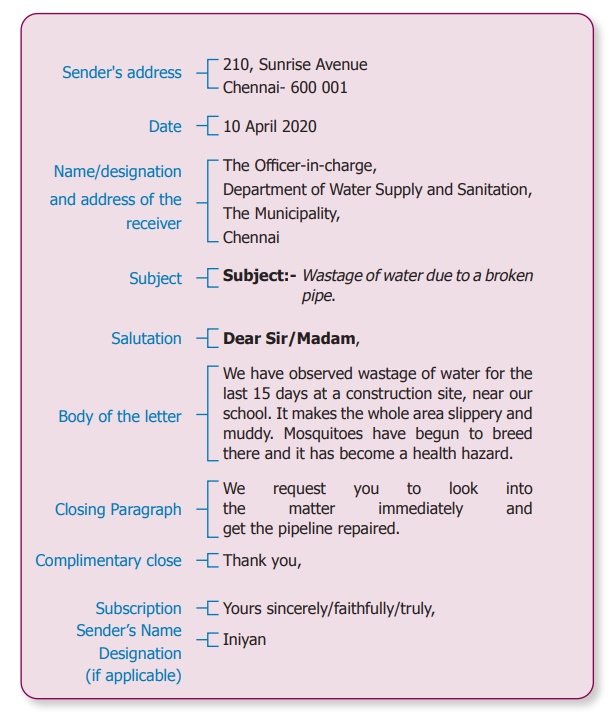
Using the given letter as a model, write a complaining letter on any one of the topics given below.
a. To the Police commissioner about the noise caused by the loud speaker in a music shop near your school.
b. To the Postmaster General on non – receipt of book parcel.
c. To the Transport Manager, TNStC on non- stopping of buses near your school bus stop.
Sample informal Letter
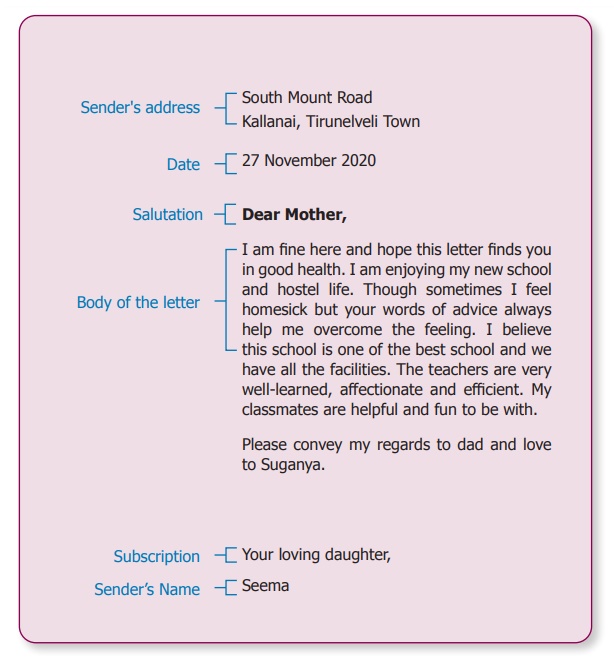
Using the given informal letter as a model, write a letter on any one of the topics given below.
a. Write letter to your father asking permission to go on a educational tour.
b. Write letter to your friend about your summer holidays.
c. Write letter to your sister advising her to take part in cultural programme in school annual day celebration.
FORMAL LETTER
Write a complaining letter on any one of the topics given below.
a) To the Police commissioner about the noise caused by the loudspeaker in a music shop near your school.
Answer:
From
Aditya
VIII std ‘A’;
Government Higher Secondary School,
Chennai – 600 011.
3rd March 2020.
To
The Police Commissioner,
Perambur, Chennai – 600 011.
Sir,
Sub : Complaint about the noise caused by the loudspeaker regarding.
We, the students of Government Higher Secondary School, are getting distracted by the noise caused by the loudspeaker in a music shop near our school. We are unable to listen to the lessons taught and concentrate on our studies. The noise from a loudspeaker is unbearable.
We request you to look into the matter immediately and take necessary action to stop this problem.
Thank you,
Yours faithfully,
Aditya
VIII Std ‘A’ Section.
Address on the Cover:
To
The Police Commissioner,
Perambur,
Chennai – 600 011.
b) To the Postmaster General on non – receipt of book parcel.
Answer:
From
G. Alex
School Pupil Leader,
SSR Higher Secondary School,
Tiruchirappalli – 620 001
10th May 2020.
To
The Postmaster General
Sangiliyandapuram,
Tiruchirappalli – 620 001.
Sir,
Sub: Complaint on the non-receipt of a book parcel – reg.
I had ordered some books from a publishing company, two weeks back. When I contacted the publishing company, they told us that they had sent us the books in a registered parcel two days back. But so far, we have not received the parcel.
You are requested to enquire into the matter and do the needful.
Thank you,
Yours faithfully,
G. Alex.
Address on the Cover:
To
The Postmaster General
Sangiliyandapuram,
Tiruchirappalli – 620 001.
c) To the Transport Manager, TNSTC on non- stopping of buses near your school bus stop.
Answer:
From
Manisha. K,
VIII Std ‘B’,
Anitha Hr. Sec. School,
Vepery, Chennai – 600 007.
4th June 2020.
To
The Transport Manager,
TNSTC, Chennai – 600 002.
Sir,
Sub : Non-stopping of buses near the school bus stop – reg.
This is to bring to your notice that TNSTC buses do not stop near our school bus stop. The students are finding it difficult to commute to school. They had to walk a long distance to come to school and then go home from school. It takes a lot of time for all of us.
We request you to kindly look into this matter and take necessary action for the benefit of our school students.
Thank you,
Yours faithfully,
Manisha. K
Address on the Cover:
To
The Transport Manager,
TNSTC,
Chennai – 600 002.
INFORMAL LETTER
Using the given informal letter as a model, write a letter on any one of the topics given below.
a) Write letter to your father asking permission to go on an educational tour.
NSK Hr. Sec. School,
Trichy.
12.06.2020
My dear Father,
I am fine here and hope this letter finds you and Mum in the best of health.
Dad, our class teacher has organized an educational tour to Ooty, next month. Industrial visit to Eucalyptus industry, Aruvankadu Cordite factory, Needle Industries, Rallies India, Hindustan Unilever, are proposed. I wish to participate in the tour. I promise to be good and take care of myself. So, please send me Rs. 1,200 for the trip. We shall be leaving on 18th July and will be back on 19th July (Sunday) night.
I am eagerly waiting for your reply.
Your loving son,
S. Mani
Address on the envelope:
To
Mr. K. Sivaram,
60-B, Gandhi Salai,
Thirunelveli.
b) Write letter to your friend about your summer holidays.
Chennai – 40
31.05.2020
My dear Ravi,
I am fine here and hope this letter finds you in good health.
I want to share my experiences during the summer vacation. I went to Ooty for ten days and the climate was really fine. I went to the Botanical Garden, where a flower show was conducted. I went to Doddabetta Peak, which is the highest peak in the Nilgiris. The view from the top of the peak is absolutely mesmerizing. I travelled in the Toy train from Mettupalayam to Ooty via Coonoor. Mudumalai National Park is attractive. Yesterday I returned from there. I am waiting to see you, Ravi.
Your loving friend,
M. Prakash
Address on the envelope:
To
Mr. T. Ravi,
26, Patel Road,
Ambattur, Chennai – 600 058.
c) Write letter to your sister advising her to take part in cultural programme in school annual day celebration.
Chennai – 40
10.01.2020
My dear sister Radha,
I hope this letter finds you in good health and spirits. I am writing this letter to advise you to take part in the cultural programme at your school annual day celebration. Some six months back, you joined the dance class and your master told me about your excellent performance. But now you hesitate to dance in your school auditorium. I think you should not feel a shy to dance in front of your teachers and other students. I wish you to participate in the dance programme. Please convey my regards to Dad and Mom.
Your loving brother,
V. Ganesh
Address on the envelope:
To
Ms. V. Radha,
D/o. Mr. A. Viswanath,
53, Gandhi Road,
perambur, Chennai – 600 019.
Grammar
Grammar
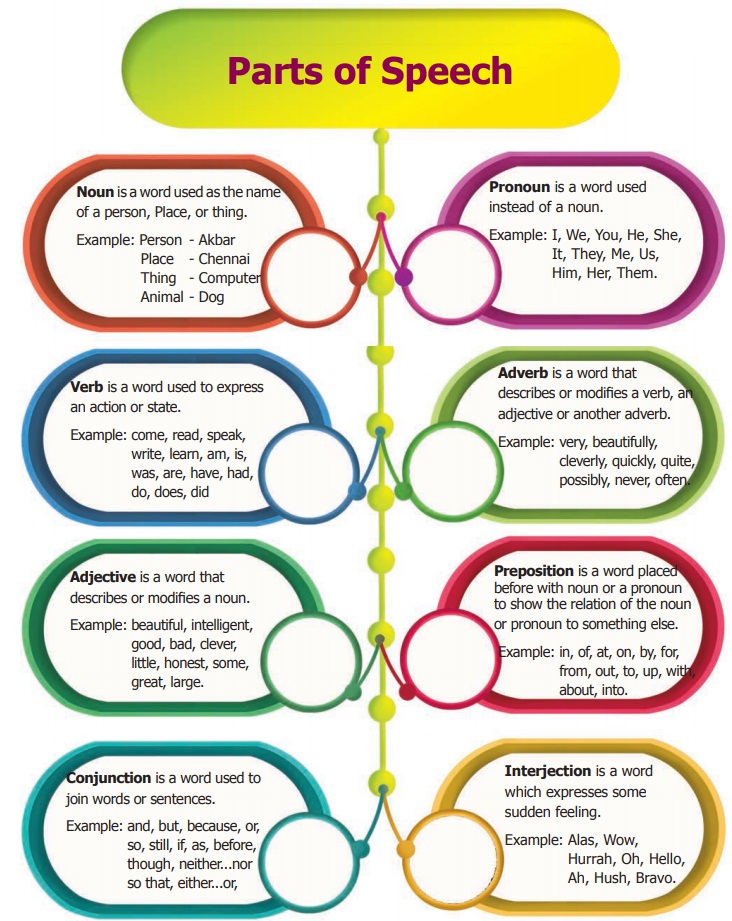
A) Noun
Noun is a word used as the name of a person, place, thing, animal or an idea.
Types of nouns: Proper noun, Common noun, Collective noun, Abstract noun, Material noun.
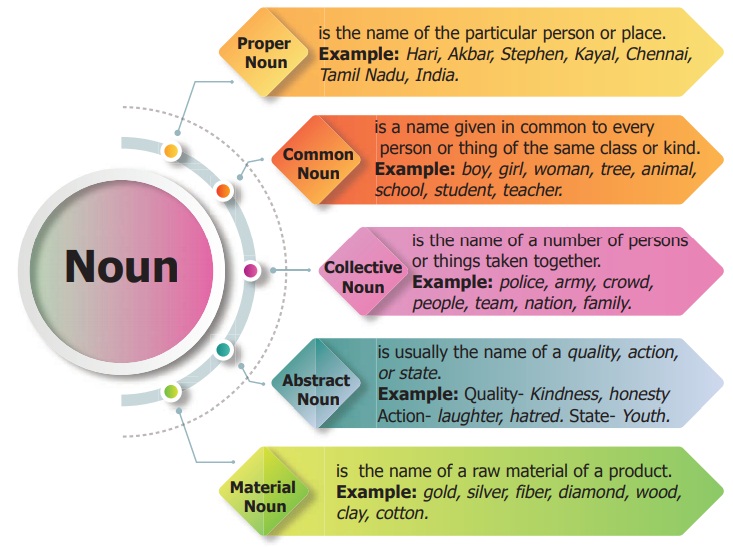
a. Pick out the words from the list and put them appropriately in the table.
David, Madurai, parrot, happiness, book, thought, green, tiger, Trichy, computer, Narayanan, fan, sister, Kalam, woman, pencil, Bharathi, problem, brother, Mumbai, swan, elephant, Vijay, solution, success, school, convent.
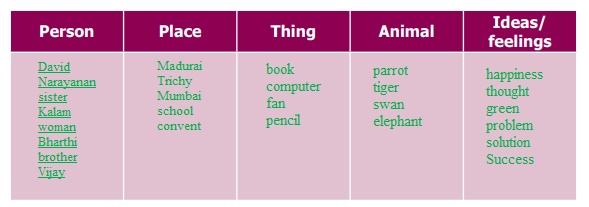
Person : David, Narayanan, sister, Kalam, woman, Bharthi, brother, Vijay
Place : Madurai, Trichy, Mumbai, school, convent
Thing : book, computer, fan, pencil
Animal : parrot, tiger, swan, elephant
Ideas/feelings : happiness, thought, green, problem, solution, Success
b. Read the following paragraph and pick out the different types of nouns and put them in the table.
Hobby is an activity that we enjoy doing in our free time. It keeps us busy in our leisure time. People choose their hobby on the basis of their interests and personality. Do you know what Dr. A.P.J. Abdul Kalam’s hobby was?

C. Fill in the blanks with the suitable collective noun.
Choir, shower, bowl, flock, cup, pair, swarm, bunch, herd, bottle
1. a herd of cows
2. a flock of birds
3. a choir of singers
4. a bottle of milk
5. a cup of tea
6. a swarm of ants
7. a bunch of grapes
8. a bow of rice
9. a pair of shoes
10. a shower of rain
B) Pronoun
Pronoun is a word used instead of a noun.
Example
Shoba always loves dancing. She wants to go to dance school.
In the above example, the word ‘she‘ replaces the noun ‘Shoba‘. So the word ‘she’ is a pronoun.
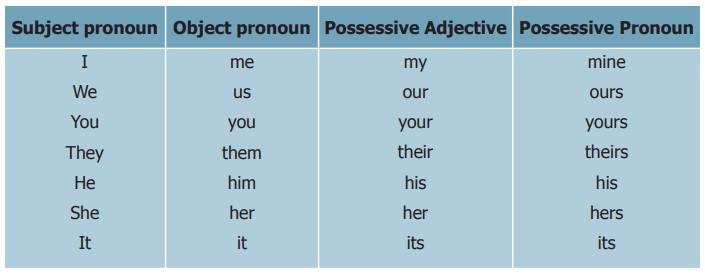
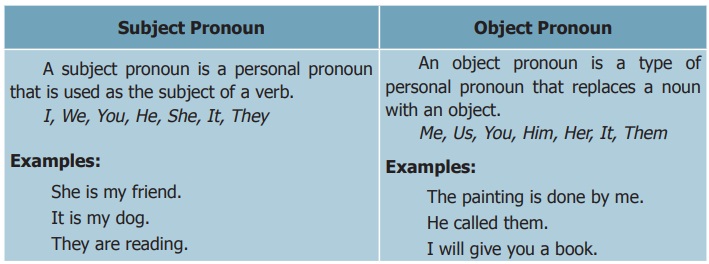
a. Change the underlined words with correct pronoun.
(they, he, her, him, it, she )
1. I saw Mr. Balu this morning and gave Mr. Balu my homework.
Answer: I saw Mr. Balu this morning and gave him my homework.
2. Muthu likes computer games, but he doesn’t play computer games very often.
Answer: Muthu likes computer games but he doesn’t play them very often.
3. My aunt lives in Trichy but, my aunt often comes to visit my family.
Answer: My aunt lives in Trichy but, she often comes to visit my family.
4. Neil Armstrong was born in 1930. Neil Armstrong landed on the moon in 1969.
Answer: Neil Armstrong was born in 1930. He landed on the moon in 1969.
5. He helped the old lady. He gave the old lady food.
Answer: .He helped the old lady. He gave her food.
Possessive pronoun and possessive adjective.
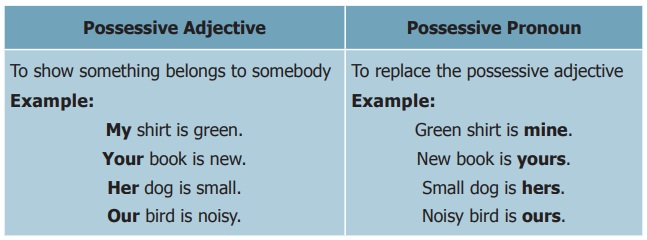
b. Change the possessive adjective into possessive pronoun.
1. This is my pen. [Answer: This pen is mine.]
2. Shenbah missed her purse. [Answer: The missed purse is hers.]
3. Her speech is nice. [Answer: The nice speech is hers.]
4. My book is new. [Answer: The new book is mine.]
5. My bike is costly. [Answer: The costly bike is mine.]
C) VERB
Verb is a word used to express an action or state.
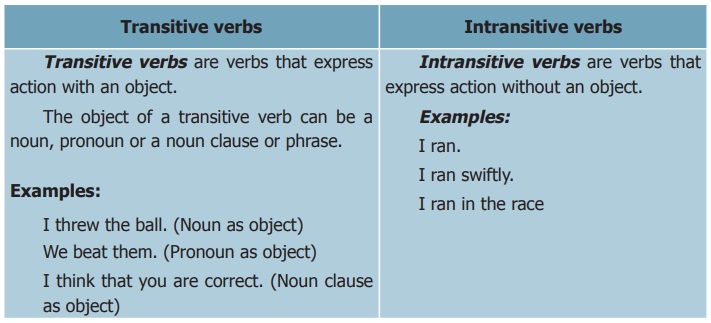
List out the transitive and intransitive verbs in following words.
come, buy, teach, learn, arrive, sing, run, draw, jump, write.
Answer:
Transitive
buy
teach
learn
sing
draw
write
Intransitive
come
arrive
run
jump
GRAMMAR ADDITIONAL
I. Guide proper names for the common nouns
Eg: Butter – Amul
1. Pencil – ———————-
[Answer: Apsara]
2. Ball pen——————–
[Answer: Reynolds]
3.Hospital- ———————–
[Answer: Apollo]
4. Soft drink – ———————
[Answer: Pepsi]
5. Car – ————————-
[Answer: Toyota]
II. Collective nouns:
1. A ————-of bees.
[Answer: swarm]
2. A ———–of keys.
[Answer: bunch]
3. A ————of cards.
[Answer: pack]
4. A ———–of players.
[Answer: team]
5. A———— of books.
[Answer: library]
III. Form abstract nouns from these adjectives :
Eg: Soft – Softness
1. Cruel – ——————–
[Answer: Cruelty]
2. Polite – ———————
[Answer: Politeness]
3. Honest – ——————–
[Answer: Honesty]
4. Beautiful – ——————-
[Answer: Beauty]
5. Lazy – ———————–
[Answer: Laziness]
IV. Use singular pronouns and fill in the blanks:
1. ——-gave———– a gift.
[Answer: He, her]
2.———- went out when————- rained.
[Answer: She, it]
3.———— do not want —————-to steal things.
[Answer: I, you]
4. When he met ———–I gave ————an advice.
[Answer: me, him]
V. Use Plural pronouns and fill in the blanks:
1. Raj and Rahul are brothers and————- live in the same house.
[Answer: they]
2. They are my friends, I meet ————in the park.
[Answer: them]
3. My father and I went to the mall, but it was closed.——– could not buy anything.
[Answer: We]
4. We won the match. Everybody congratulated————
[Answer: us]
VI. Fill in the blanks with possessive pronouns:
1. The travellers brought a lot of goods. The goods were ———–.
[Answer: theirs]
2. A man was riding a motor bike. The bike was ———.
[Answer: his]
3. She stitched the torn dresses from her cupboard. The dresses were ————-,
[Answer: hers]
4. The certificates belong to me. They are————.
[Answer: mine]
5. This classroom belongs to us. It is certainly——————-.
[Answer: ours]
6. The photos look so good. They are—————-.
[Answer: yours]
7. The dog has a puppy. It is————.
[Answer: its]
VII. Use simple present tense of verb in the bracket and fill the blanks:
1. Look! He (fly)———–the kite high..
[Answer: flies]
2. Yesterday he went by car, but today he (go)———— on a cycle.
[Answer: goes]
3. If he (pass)————- the exam, he will get a good job.
[Answer: passes]
4. Mohan will jump in joy if he (see)———— you coming.
[Answer: sees]
5. If Vijay (run) ————-fast, he will be able to catch the train.
[Answer: runs]
VIII. Use simple past tense of verb in the bracket and fill the blanks:
1. I (buy)———–this coat from the boutique.
[Answer: bought]
2. Dad (leave)—————- for office an hour ago.
[Answer: left]
3. My sister (write) ————an essay that was published in the magazine.
[Answer: wrote]
4. We (come)——- home, (take)———— some rest and (spend)——- time playing cards.
[Answer: came / took /spent]
IX. Use simple future tense of verb in the bracket and fill the blanks:
1. I (leave)———–for Paris next week.
[Answer: will leave]
2. We (party)———- at the Taj on my birthday.
[Answer: will party]
3. You (move)——— to Delhi next month on promotion.
[Answer: will move]
4. Ten students failed in the exam. They (write)———– their exams again from Monday.
[Answer: will write]
5. The sun rise was at 6 a.m. It (set)———– at 5.45 p.m this evening.
[Answer: will set]
X. Insert the correct form of infinitive using the given verbs in the brackets:
1. It would be nice to ——–(meet) Dr. Abdul Kalam again.
[Answer: meet]
2. To———– (cook) this recipe, you will need 500 grams of minced meet
[Answer: cook]
3. Ravi wants to I need to———(take) Raji to the amusement park.
[Answer: take]
4. I need to———–(wash) my hands before I have my food.
[Answer: wash]
5. We discussed whether to———— (invite) Rajiv or not.
[Answer: invite]
XI. Fill in the blanks with suitable Gerund (verb+ing):
1.——— (meet) is a periodic event.
[Answer: Meeting]
2. She loves———– (eat) ice creams.
[Answer: eating]
3. I like———-(celebrate) festivals.
[Answer: celebrating]
4.————- (wait) is torturing.
[Answer: Waiting
5. He was awarded for ———-(run) fast.
[Answer: running]
6. I achieve by ———– (work).
[Answer: working]
7. I don’t like————(play) cards.
[Answer: playing]
8.———– (cook) is my hobby.
[Answer: – Cooking]
9. Do you enjoy———— (swim)
[Answer: swimming]
10. He loves———— (sing) songs.
[Answer: singing]
Language Check Point
Incorrect: I cannot cope up with this pressure.
Correct: I cannot cope with this pressure.
Usage: The meaning of cope is to manage. Cope is followed by the preposition ‘with’, and never followed by ‘up’.
Incorrect: What is the time in your watch?
Correct: He has grey hair.
Usage: All the hair on one’s head is considered uncountable and so, ‘hairs’ is almost always incorrect.
Incorrect: He has grey hairs.
Correct: What is the time by your watch?
Usage: In your watch is incorrect. Use by to ask time.













